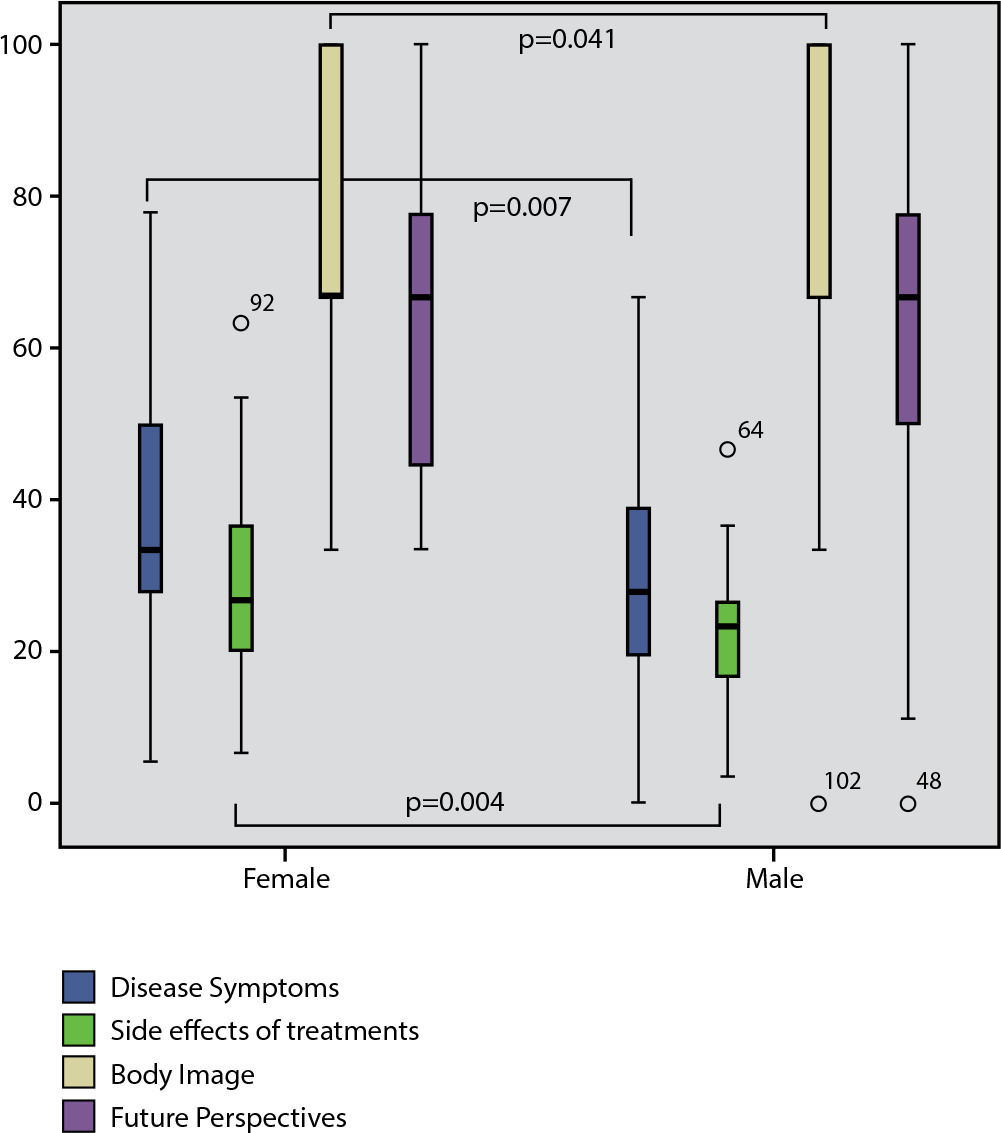-
ORIGINAL ARTICLE05-03-2024
Psychometric properties of the Chilean version of the quality of life questionnaire for multiple myeloma
Revista Brasileira de Enfermagem. 2024;77(1):e20230100
Abstract
ORIGINAL ARTICLEPsychometric properties of the Chilean version of the quality of life questionnaire for multiple myeloma
Revista Brasileira de Enfermagem. 2024;77(1):e20230100
DOI 10.1590/0034-7167-2023-0100
Views0See moreABSTRACT
Objectives:
To evaluate the internal consistency and construct validity of the QLQ-MY20 for assessing the quality of life in multiple myeloma survivors in Chile.
Methods:
This was a cross-sectional study conducted between March 2020 and December 2022. It involved 118 individuals from two public hospitals. The QLQ-C30 and QLQ-MY20 questionnaires were used. Internal consistency was assessed using Cronbach’s alpha(α), and construct validity was evaluated through hypothesis testing (Mann-Whitney and Spearman correlation).
Results:
The average age of participants was 67.2 years (SD=9.2). Internal consistency for the complete scale was α=0.779, for the “disease symptoms” dimension α=0.671, for the “side effects of treatments” dimension α=0.538, and for the “future perspective” dimension α=0.670. Four of the five construct validity hypotheses were confirmed: women, individuals with worse performance status, those with pain, and those with worse fatigue showed more symptoms.
Conclusions:
The Chilean version of the QLQ-MY20 demonstrates adequate internal consistency and construct validity.

-
ORIGINAL ARTICLE10-09-2023
Translation and validity of the Multidimensional Individual and Interpersonal Resilience Measure
Revista Brasileira de Enfermagem. 2023;76(4):e20220696
Abstract
ORIGINAL ARTICLETranslation and validity of the Multidimensional Individual and Interpersonal Resilience Measure
Revista Brasileira de Enfermagem. 2023;76(4):e20220696
DOI 10.1590/0034-7167-2022-0696
Views0See moreABSTRACT
Objective:
to translate, culturally adapt and validate the Multidimensional Individual and Interpersonal Resilience Measure to Brazilian Portuguese.
Method:
after initial translation, the pre-final version underwent rigorous cultural adaptation procedures. As a result, the final adapted version was submitted to a validity study.
Results:
adaptation procedures provided equivalence between the pre-final and the original versions in semantic, idiomatic, experiential and conceptual terms. A total of 187 older adults were included in the validity study. Exploratory factorial analysis (EFA) generated a model of five factors ((RMSEA = 0.030; TLI = 0.959; X = 151.590 p> 0.05). Final version showed adequate consistency (Cronbach’s α = 0.705) and test-retest reliability (ICC=0.835). No statistically significant correlation was found between resilience and sociodemographic and epidemiological variables assessed in this study.
Conclusion:
EMRII-BR is a valid and reliable instrument for measuring resilience in Brazilian older adults.
-
ORIGINAL ARTICLE06-24-2022
Transcultural Translation and Validation of Lasater Clinical Judgment Rubric©
Revista Brasileira de Enfermagem. 2022;75(6):e20210880
Abstract
ORIGINAL ARTICLETranscultural Translation and Validation of Lasater Clinical Judgment Rubric©
Revista Brasileira de Enfermagem. 2022;75(6):e20210880
DOI 10.1590/0034-7167-2021-0880
Views0See moreABSTRACT
Objectives:
to translate and cross-culturally validate the Lasater Clinical Judgment Rubric© (LCJR©) instrument for nursing students.
Methods:
the application of LCJR-PT© was preceded by a linguistic translation into Portuguese, based on the translation-back-translation method. This psychometric study involved 32 nursing students from a program in Portugal. Data were collected through observations of two independent observers during the performance of the practices developed by the students, through the scenarios validated by experts of high and of medium-fidelity simulation.
Results:
of the 64 observations obtained from the practices of nursing students, the value of intra-class correlations in the 4 aspects of the instrument exceeded 0.792. There was a global Cronbach’s alpha of LCJR-PT© of 0.921 and 0.876 in Observers 1 and 2 respectively, with a statistically significant level of agreement.
Conclusions:
the LCJR-PT© is a valid and reliable instrument, demonstrating a high potential for its use in clinical education and nursing research.



